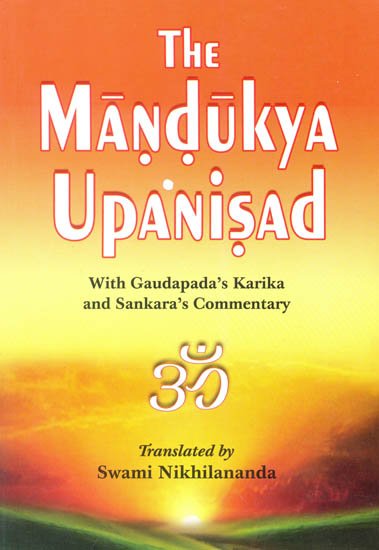Mandukya Upanishad (Gaudapa Karika and Shankara Bhashya)
by Swami Nikhilananda | 1949 | 115,575 words | ISBN-13: 9788175050228
This is verse 4.95 of the Mandukya Karika English translation, including commentaries by Gaudapada (Karika), Shankara (Bhashya) and a glossary by Anandagiri (Tika). Alternate transliteration: Māṇḍūkya-upaniṣad 4.95, Gauḍapāda Kārikā, Śaṅkara Bhāṣya, Ānandagiri Ṭīkā.
Mandukya Karika, verse 4.95
Sanskrit text, IAST transliteration and English translation
अजे साम्ये तु ये केचिद्भविष्यन्ति सुनिश्चिताः ।
ते हि लोके महाज्ञानास्तच्च लोको न गाहते ॥ ९५ ॥aje sāmye tu ye kecidbhaviṣyanti suniścitāḥ |
te hi loke mahājñānāstacca loko na gāhate || 95 ||95. They alone are said to be of the highest wisdom who are firm in their conviction of the Seif unborn and ever the same. This, ordinary men cannot understand.
Shankara Bhashya (commentary)
That this knowledge of the Supreme Reality is incapable of being understood by the poor intellect, by the unwise,1 i.e., by persons of small intellect who are2 outside the knowledge of Vedānta,—is thus explained in this verse. Those few, even though3 they may be women or others, who are firm in their conviction of the nature of Ultimate Reality, unborn and undivided, are alone possessors of the highest wisdom. They alone know the essence of Reality. Others,4 i.e., persons of ordinary, intellect, cannot understand their ways, that is to say, the Supreme Reality realised by the wise. It is said in the Smṛti:—“Even the gods5 feel puzzled while trying to follow in the footsteps of those who leave no track behind, of those who realise themselves in all beings and who are always devoted to the welfare of all. They? leave6 no track behind like the birds flying through the sky.”
Anandagiri Tika (glossary)
1 The unwise— That is, men devoid of discrimination.
2 Who are, etc.—The Vedānta Scriptures alone can illumine us regarding the real nature of the Self. But the real meaning of the Vedānta can be understood only through reason.
3 Even though— Women and Śudrās were interdicted from the study of the Upaniṣads though it was conceded that they could attain to the highest knowledge through Smṛti. This was the tradition in India during post-Upaniṣadic age. But in the age of the Upaniṣads, women were certainly not precluded from seeking or attaining the highest knowledge. Many inspiring portions of the Vedas were composed by women.
4 Others, etc.—Ordinary people cannot appreciate the life and activities of the truly wise because the former do not understand the truth about, and believe in Brahman and the phenomenal world.
5 Gods—That is to say, the beings that are said to move in a higher plane of existence. They also stand stupefied before the Knowers of Brahman as the former have not yet transcended the realm of duality.
6 They leave, etc.—The wise, on account of their realisation of the non-dual Ātman, never manifest by way of advertisement, any supernatural characteristics by which the ordinary men could mark their greatness. The life of the truly wise is perfectly natural though their angle of vision is totally different from that of the ordinary folk. Hence no one except those who have similar wisdom can. understand the nature of the wise.
